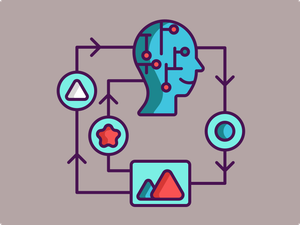What is Reinforcement learning?
Reinforcement learning is a machine learning technique where an agent interacts with an environment to learn how to reach a desired goal. Unlike supervised and unsupervised learning, reinforcement learning operates on a different principle - it learns from feedback received from the environment through a system of rewards and penalties.
Key Components of Reinforcement Learning:
-
Agent: The entity that learns and makes decisions. It interacts with the environment and learns to take actions to maximize cumulative rewards.
-
Environment: This refers to the external system with which the agent interacts. It provides feedback to the agent based on its actions and may change state in response to those actions.
-
State: The current situation or configuration of the environment.
-
Action: This refers to a decision or choice made by the agent at a given state.
-
Reward: The feedback signal from the environment that indicates how good or bad the action taken by the agent was. The objective of the agent is to increase the total rewards earned over a period of time.
Where is Reinforcement Learning to solve real-world problems?
Reinforcement learning finds applications in various domains where decision-making under uncertainty is involved. Here are some examples where it is used:
1. Game Playing:
-
The main problem that reinforcement learning would solve in this context is to teaching an agent to play games optimally. This applies to the environment in which the algorithm is being implemented and a prime example is the game environment, such as chess, Go, or video games.
-
Applications of reinforcement learning algorithms, such as Deep Q-Networks (DQN), can be used to train agents to play games by learning from the rewards received during gameplay. For instance, AlphaGo, developed by DeepMind, used reinforcement learning techniques to master the game of Go and defeat human champions.
2. Robotics Control:
-
Another problem that reinforcement learning can accomplish is to train robots to perform tasks in real-world environments.
-
This means reinforcement learning algorithms can be applied to train robots to perform tasks such as navigation, grasping objects, or manipulating tools. By rewarding desirable behaviors and penalizing mistakes, robots can learn to accomplish tasks autonomously in complex and dynamic environments.
3. Autonomous Driving:
-
Another scenario in which reinforcement learning can be applied is developing self-driving vehicles that can navigate roads safely and efficiently.
-
This means that: reinforcement learning techniques can be used to train autonomous vehicles to make decisions such as accelerating, braking, and steering based on input from sensors (e.g., cameras, lidar, radar) and environmental feedback. By learning from interactions with simulated or real-world driving scenarios, self-driving systems can improve their driving behavior over time.
4. Personalized Recommendations:
-
Suppose you are to create an online platform that recommends products, movies, or content to users. You can simply use reinforcement learning algorithms to build up online platforms or streaming services.
-
This is because reinforcement learning algorithms can learn user preferences and optimize recommendations by maximizing user engagement or satisfaction. By observing user interactions (e.g., clicks, views, ratings) and adjusting recommendations accordingly, these systems can provide personalized content tailored to individual preferences.
Conclusion
These examples demonstrate how reinforcement learning techniques can be applied to solve complex decision-making problems across a wide range of domains, from games and robotics to personalized services and autonomous systems. By learning from interaction with the environment and optimizing actions based on rewards, agents can acquire adaptive and intelligent behavior in diverse real-world scenarios.
As always, if you found this article helpful consider subscribing and sharing.
Thanks for reading.

